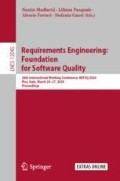Abstract
[Context & motivation] Requirements engineering (RE) can be seen as creative problem solving (CPS), overlapping with user experience (UX) and design activities. Creative processes, such as innovation workshops (IWs), are often facilitated group activities. They provide an understanding of challenges and user needs, leading to increased software quality. A large number of results from IWs needs to be documented in a suitable manner for later use, as not all results can be followed up upon immediately. [Question/problem] With current means of IW documentation, it is hard to extract the required information (e.g., photo minutes), or they are inefficient to produce or digest (e.g., audio and video recordings, textual documentation). Documentation of only the results leads to the loss of any discussions, decisions, reasons, and discarded alternatives, as these are usually not written down during an IW. The interpretation of the documentation depends on the viewer’s memory and understanding of the IW and the results, which is prone to misinterpretation and errors unless enriched with context information from the IW planning. [Principal ideas/results] We explored the limitations of IW documentation during a workshop with 29 experts from the usability and UX domain. Problems with using the results in later software engineering (SE), RE, and UX activities arise from misalignment between IW result documentation and activity requirements. The experts created a set of initial solution ideas, but no concrete solutions. [Contributions] We address the need for reasonable methods for documenting the results of IWs so that they can be used efficiently in later activities. The design and preliminary results of the expert workshop are presented. Furthermore, we discuss a research roadmap towards making targeted improvements to IW documentation by understanding subsequent activities.
Access this chapter
Tax calculation will be finalised at checkout
Purchases are for personal use only
References
Adam, S., Trapp, M.: Success factors for creativity workshops in RE. In: CEUR Workshop Proceedings, vol. 1342, pp. 54–61 (2015)
Barrios, P.C., Monticolo, D., Sidhom, S., Gabriel, A.: An organizational model to understand the creativity workshop. In: 2017 13th International Conference on Signal-Image Technology Internet-Based System, pp. 496–502. IEEE, December 2017. https://doi.org/10.1109/SITIS.2017.87. http://ieeexplore.ieee.org/document/8334793/
Brem, A., Spoedt, H.: Same same but different: perspectives on creativity workshops by design and business. IEEE Eng. Manag. Rev. 45(1), 27–31 (2017). https://doi.org/10.1109/EMR.2017.2667143
Kerkow, D., Adam, S., Riegel, N., Ünalan, Ö.: A creativity method for business information systems. In: 16th International Working Conference on Requirements Engineering: Foundation for Software Quality, Proceedings of the Workshop CreaRE, PLREQ, RePriCo RESC, pp. 8–20 (2010)
Haigh, T.: Hey Google, what’s a moonshot? How Silicon Valley mocks Apollo. Commun. ACM 62(1), 24–30 (2018)
Inayat, I., Salim, S.S., Marczak, S., Daneva, M., Shamshirband, S.: A systematic literature review on agile requirements engineering practices and challenges. Comput. Hum. Behav. 51, 915–929 (2015). https://doi.org/10.1016/j.chb.2014.10.046
Karras, O.: Software professionals’ attitudes towards video as a medium in requirements engineering. In: Kuhrmann, M., et al. (eds.) PROFES 2018. LNCS, vol. 11271, pp. 150–158. Springer, Cham (2018). https://doi.org/10.1007/978-3-030-03673-7_11
Karras, O., Kiesling, S., Schneider, K.: Supporting requirements elicitation by tool-supported video analysis. In: Proceedings of the 2016 IEEE 24th International Requirements Engineering Conference, RE 2016, pp. 146–155 (2016). https://doi.org/10.1109/RE.2016.10
Knapp, J., Zeratsky, J., Kowitz, B.: Sprint: how to solve big problems and test new ideas in just five days. Simon and Schuster (2016)
Maiden, N., Jones, S., Karlsen, K., Neill, R., Zachos, K., Milne, A.: Requirements engineering as creative problem solving: a research agenda for idea finding. In: Proceedings of the 2010 18th IEEE International Requirements Engineering Conference, RE 2010, pp. 57–66 (2010). https://doi.org/10.1109/RE.2010.16
Maiden, N., Manning, S., Robertson, S., Greenwood, J.: Integrating creativity workshops into structured requirements processes. In: Proceedings of the 2004 Conference on Designing Interactive Systems: Processes, Practices, Methods, and Techniques, DIS 2004, p. 113. ACM Press, New York (2004). https://doi.org/10.1145/1013115.1013132. http://portal.acm.org/citation.cfm?doid=1013115.1013132
Maiden, N., Ncube, C., Robertson, S.: Can Requirements Be Creative? Experiences with an Enhanced Air Space Management System Centre for HCI Design, City University, London, UK Atlantic Systems Guild, London, UK Abstract (2007)
Mennig, P., Trapp, M.: Designing flexible creative spaces. In: CEUR Workshop Proceedings, vol. 2376 (2019). http://ceur-ws.org/Vol-2376/CreaRE_paper2.pdf
Plain, C.: Build an affinity for KJ method. Qual. Prog. 40(3), 88 (2007)
Acknowledgements
Parts of this work have been funded by the “EnStadt: Pfaff” project (grants no. 03SBE112D and 03SBE112G) of the German Federal Ministry for Economic Affairs and Energy (BMWi) and the German Federal Ministry of Education and Research (BMBF).
Author information
Authors and Affiliations
Corresponding author
Editor information
Editors and Affiliations
Rights and permissions
Copyright information
© 2020 Springer Nature Switzerland AG
About this paper
Cite this paper
Mennig, P., Nass, C. (2020). Innovation Workshop Documentation for Following Software Engineering Activities. In: Madhavji, N., Pasquale, L., Ferrari, A., Gnesi, S. (eds) Requirements Engineering: Foundation for Software Quality. REFSQ 2020. Lecture Notes in Computer Science(), vol 12045. Springer, Cham. https://doi.org/10.1007/978-3-030-44429-7_5
Download citation
DOI: https://doi.org/10.1007/978-3-030-44429-7_5
Published:
Publisher Name: Springer, Cham
Print ISBN: 978-3-030-44428-0
Online ISBN: 978-3-030-44429-7
eBook Packages: Computer ScienceComputer Science (R0)

